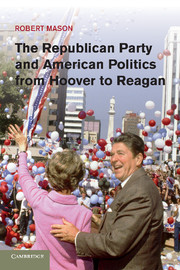Book contents
- Frontmatter
- Contents
- Acknowledgments
- Introduction
- 1 “From Old Home Melodies to Jazz Music”: 1928–1933
- 2 “As Maine Goes, So Goes Vermont”: 1933–1939
- 3 “The Simple Barefoot Wall Street Lawyer”: 1939–1945
- 4 “Liberty versus Socialism”: 1945–1953
- 5 “Modern Republicanism”: 1953–1961
- 6 “A Choice, Not an Echo”: 1960–1968
- 7 “There’s a Realignment Going On”: 1968–1976
- 8 “You Are Witnessing the Great Realignment”: 1977–1989
- Conclusion
- Archival Sources
- Index
- References
8 - “You Are Witnessing the Great Realignment”: 1977–1989
Published online by Cambridge University Press: 05 December 2011
- Frontmatter
- Contents
- Acknowledgments
- Introduction
- 1 “From Old Home Melodies to Jazz Music”: 1928–1933
- 2 “As Maine Goes, So Goes Vermont”: 1933–1939
- 3 “The Simple Barefoot Wall Street Lawyer”: 1939–1945
- 4 “Liberty versus Socialism”: 1945–1953
- 5 “Modern Republicanism”: 1953–1961
- 6 “A Choice, Not an Echo”: 1960–1968
- 7 “There’s a Realignment Going On”: 1968–1976
- 8 “You Are Witnessing the Great Realignment”: 1977–1989
- Conclusion
- Archival Sources
- Index
- References
Summary
The Republican Party’s comeback from its slump of the mid-1970s, a time yet again of predictions about its demise, was swift and resounding. In fall 1977 the Gallup poll organization reported its lowest-ever figure for voter identification with the party: only one in five, against almost one in two for the Democrats. But the results of the 1980 elections encouraged the belief that the GOP was finding an enduring majority at last, that Americans were decisively turning away from New Deal liberalism. Ronald Reagan won 51 percent of the popular vote against President Jimmy Carter’s 41 percent share; independent John Anderson, a moderate Republican disillusioned with the party’s conservatism, picked up most of the rest. The party won the Senate for the first time since 1952, defeating nine Democrats to achieve a margin of fifty-three to forty-six (with Virginia’s Harry F. Byrd sitting as a conservative independent). In the House, the party made a net gain of 33 to reach 192, compared with the Democrats’ 243.
Frustrations with the Carter record created for the Republicans what political scientist Austin Ranney called “a great opportunity to become again the nation’s majority party.” According to Ranney, success depended on how Republicans responded to this opportunity under Reagan as president. That leadership fostered confidence; optimism about the GOP future reached a zenith in 1984, buoyed by Reagan’s reelection prospects as a popular incumbent and by disarray within the Democratic Party. Capturing the mood, a spectator at one campaign event held a sign that read, “You are witnessing the great realignment.” Once more, the hopes of realignment were to end in disappointment. Once more, the party failed to share fully the electorate’s confidence in a popular president.
- Type
- Chapter
- Information
- The Republican Party and American Politics from Hoover to Reagan , pp. 247 - 281Publisher: Cambridge University PressPrint publication year: 2011



